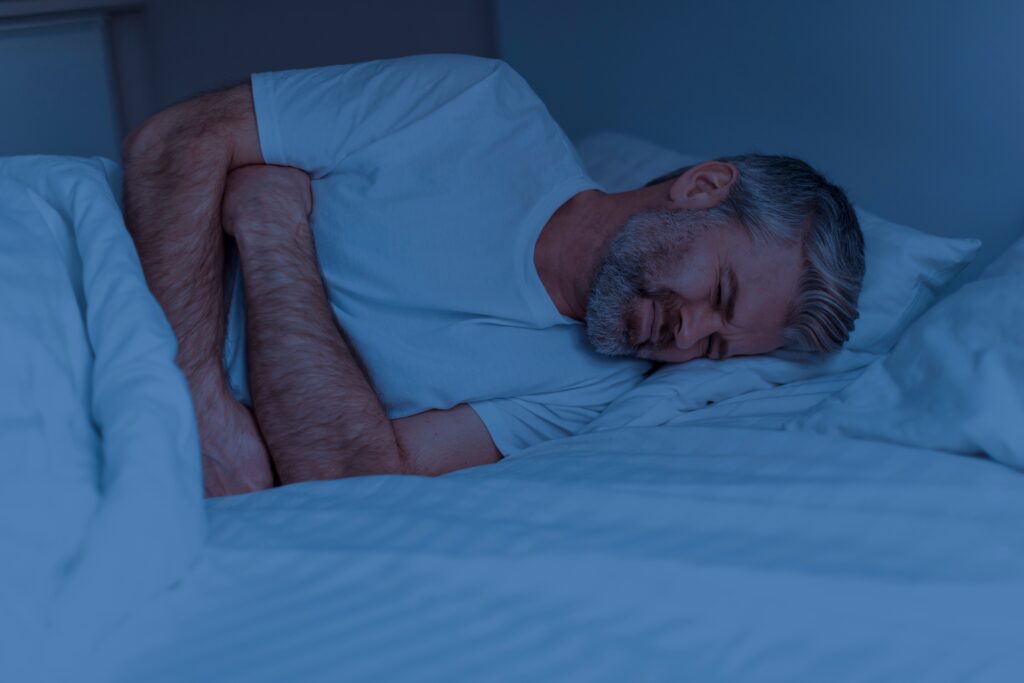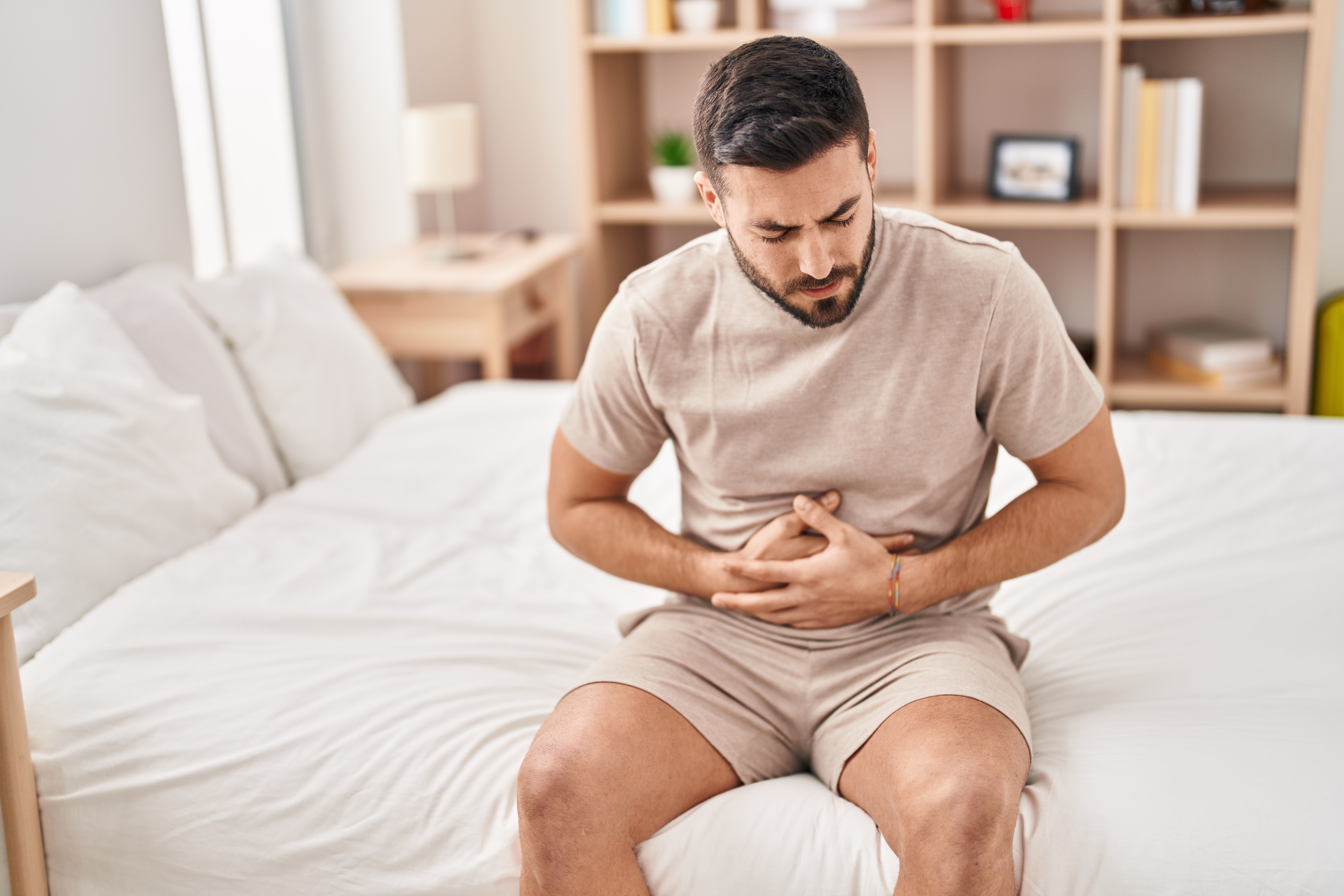September 15, 2023
How to Stop Stomach Pain at Night
Stomach pain at night is not only uncomfortable but can contribute to poor quality sleep and low energy. Nighttime stomach pain can occur for a variety of reasons, but uncovering its root cause may help you find relief and get a better night’s sleep.
Here are seven ways on how to stop stomach pains at night, and how to request an appointment with Healthcare Associates of Texas if your pain won’t go away.
What Causes Stomach Pain at Night?
Any pain in your stomach that you feel only at nighttime is usually related to digestion, or your eating habits. Many times, changing the way you eat—along with the foods you eat—can help reduce your symptoms.
Common causes of stomach pain at night include:
- Eating large meals too closely before bedtime.

- Lying down on the couch or bed immediately after eating.
- Gas.
- Constipation.
- Food intolerances, such as that to lactose.
- Acid reflux or heartburn.
- Gastroesophageal reflux disease, more commonly known as GERD.
- Gastritis, which is irritation and inflammation of the stomach lining.
- Stomach ulcers.
- Irritable bowel syndrome.
- Gallstones.
- Celiac disease, which is a gluten allergy.
- Menstrual cramps.
- Crohn’s disease.
How To Stop Stomach Pain At Night: 7 Ways To Find Relief
If your nighttime stomach pain is being caused by certain eating-related behaviors—such as eating too closely before bedtime—correcting the behavior can often help you find relief. However, if your stomach pain is caused by a medical condition such as GERD or Crohn’s disease, you may need to see your doctor to receive treatment.
1. Take Medicines
 Many over-the-counter (OTC) medicines may reduce your stomach pain, depending on its root cause. For example, if your nightly stomach pain is being caused by gas, you could try taking an OTC medicine that makes it easier for gas to pass through your digestive tract and out of your body.
Many over-the-counter (OTC) medicines may reduce your stomach pain, depending on its root cause. For example, if your nightly stomach pain is being caused by gas, you could try taking an OTC medicine that makes it easier for gas to pass through your digestive tract and out of your body.
OTC medicines are available to treat stomach pain caused by gas, constipation, acid reflux, and food intolerances. Check with your doctor before starting an OTC medicine to make sure it can effectively treat your symptoms.
2. Change Your Diet
Nighttime stomach pain may be caused by certain foods you are eating close to bedtime. Beans, spicy foods, and fried foods are examples of foods that may be causing stomach pain. Try avoiding foods like these—especially at night—to see if your stomach pain at night goes away.
Eating more high-fiber foods may also stop nighttime stomach pain. Fiber can make your stool bulkier and help it pass more easily through your digestive tract. Oatmeal, leafy greens, and pears are some of the many healthy high-fiber foods to include in your diet.
3. Drink Less Alcohol
When consumed in high amounts, alcohol can irritate and inflame your gut to cause a wide range of symptoms, including stomach pain. Alcohol can also increase your risk for gastritis and stomach ulcers.
If you drink alcohol in the evenings, try drinking less, or stop drinking completely to see if your stomach pain goes away. You could also try drinking earlier in the day to avoid stomach pain at night.
4. Lose Excess Weight
Being overweight or obese increases your risk for medical problems that can cause nighttime stomach pain. Gallstones, GERD, and acid reflux are all linked to obesity and excess weight. Therefore, losing weight may help relieve your stomach pain.
Steps you can take to lose excess weight include exercising regularly, improving your diet/nutrition, and managing stress. If you need help losing weight, talk to your doctor about medical weight-loss options such as medications, nutrition counseling, or bariatric surgery.
5. Exercise Regularly
Regular physical activity may help you avoid many problems associated with stomach pain, such as gas, indigestion, and constipation.  Exercising can also help you maintain a healthy weight and reduce your risk for digestive problems linked to obesity.
Exercising can also help you maintain a healthy weight and reduce your risk for digestive problems linked to obesity.
Start exercising regularly and do activities you enjoy so you can stick to a routine. If you have a health condition that prevents you from doing certain activities, talk to your doctor about the best ways to stay active.
6. Eat More Slowly
Eating too quickly can cause you to swallow large volumes of air that contribute to gas, heartburn, and indigestion. It may also cause you to swallow large chunks of food that are more difficult for your body to digest.
When sitting down for meals, try to eat more mindfully to avoid stomach pain. Eat more slowly and chew your food more thoroughly before swallowing. Also, avoid eating while driving or watching TV, which can distract you from eating slowly.
7. Try Herbal Teas
Certain herbal teas may calm your stomach and help you digest foods more easily. Ginger, peppermint, cinnamon, chamomile, and licorice teas are all found to produce pain-relieving benefits.
Start drinking these herbal teas after meals, or within a few hours before bedtime to stop experiencing stomach pain at night. Check with your doctor before drinking herbal teas, as some herbs may interact with your medications or cause problems during pregnancy.
Ways To Prevent Nighttime Stomach Pain
The key to preventing stomach pain at night is knowing what is causing your pain. Then, you can make the right lifestyle changes as needed or receive treatment for the condition causing your symptoms.
Here are simple ways to prevent nighttime stomach pain, or reduce your risk:
- Raise the head of your bed. This can help stomach contents flow downward.

- Avoid eating too closely before bedtime. This includes snacks and desserts.
- Avoid consuming acidic foods in the evening, such as coffee and tomatoes.
- Stop drinking alcohol at night.
- Eat smaller food portions.
- Exercise on most days of the week.
- Talk to your doctor about treating an underlying condition that is causing your stomach pain.
When To See a Doctor
Make an appointment with your doctor if your stomach pain is severe or won’t go away after trying one or more of the above remedies. It’s also time to see a doctor if your nighttime stomach pain is accompanied by other symptoms, including:
- Fever.
- Nausea and vomiting.
- Jaundice (yellowing of the skin and eyes).
- Difficulty breathing.
- Abdominal swelling.
- Pain when touching the abdomen.
- Unexplained weight loss.
- Muscle and joint aches.
- Dark or bloody stool.
Your doctor can perform an exam, review your medical history, and run the necessary diagnostic tests to find out the cause of your nighttime stomach pain.
Request an appointment with Healthcare Associates of Texas today if you need help identifying the root cause of your nighttime stomach pain. We offer a variety of primary care services and can talk to you in more detail about how to stop stomach pains at night.
References
- “Abdominal Pain: MedlinePlus Medical Encyclopedia,” February 7, 2022. https://medlineplus.gov/ency/article/003120.htm.
- Bishehsari, Faraz. “Alcohol and Gut-Derived Inflammation.” PubMed Central (PMC), 2017. https://www.ncbi.nlm.nih.gov/pmc/articles/PMC5513683/.
- “Chamomile: A Herbal Medicine of the Past with a Bright Future (Review).” Molecular Medicine Reports 3, no. 6 (September 28, 2010). https://doi.org/10.3892/mmr.2010.377.
DISCLAIMER
The information featured in this site is general in nature. The site provides health information designed to complement your personal health management. It does not provide medical advice or health services and is not meant to replace professional advice or imply coverage of specific clinical services or products. The inclusion of links to other web sites does not imply any endorsement of the material on such websites.



